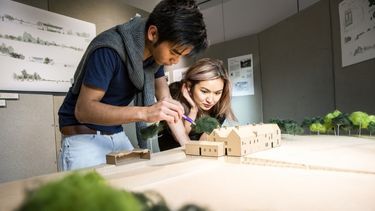
Architecture
Robert Gordon University is ranked 26th in the UK for Architecture (The Guardian 2026).
Undergraduate Pathway in Architecture
- Degrees carry accreditation from a range of professional bodies, and work experience is a core part of the course structure, taking place in Year 4.
- RGU works in continual partnership with industry, particularly on high-impact topics such as the environment and sustainability. You will work on projects that focus on today’s challenges whilst anticipating the needs of tomorrow.
- Past alumni have contributed to world-renowned projects, such as the Petronas Towers in Kuala Lumpur and Guangzhou Opera House.
Duration
- Integrated MArch: 6-year visa
Intakes
- September
Location
- Aberdeen
Degrees Available
Master of Architecture (MArch)
This degree allows you to progress seamlessly from Year 1 to Master’s level and obtain professional registration. The first three years lead to the award of BSc, and the final two years comprise the Master’s element of the degree.
The three main components of the undergraduate level are:
- Architectural Design Studio
- Architectural History and Design Philosophy
- Technology: Construction, Structural Design, and Environmental Design.
Find out more: Master of Architecture (MArch)
Scott Sutherland School of Architecture and Built Environment
| Year | Location | Duration | Fee |
|---|---|---|---|
| First Year Degree | ICRGU | 2 semesters | ICRGU Fees |
| Second and Third Year Degree | Scott Sutherland School of Architecture and Built Environment, RGU | 2 semesters | RGU Fees |
| Fourth Year Degree | Students are required to apply for opportunities for professional work experience | - | £1,000 |
| Fifth and Sixth Year Degree (Exit - MArch) | Scott Sutherland School of Architecture and Built Environment, RGU | 4 semesters | RGU Fees |
Course Details
Modules
Interactive Learning Skills and Communication
You will develop the academic and communication skills needed for success in Higher Education. You will gain independent learning skills and learn to take responsibility for your personal, academic and professional development. You will also learn how to use a range of digital technologies.
Architectural Design Studio
You will undertake a series of exploratory studio projects to analyse a brief and to investigate various criteria (such as performance and sustainability) in relation to design, architectural ethos and building elements.
Introduction to Building Technology
This module will help you understand the construction of existing and new-build domestic buildings. You will do a strategic site analysis, considering the basic principles of the following:
- Sustainable design
- Site-specific design
- Design precedent
- Opportunities for renewable technologies
- The impact of buildings on their immediate environment.
Design Philosophy
You will develop your understanding of the changing patterns of architectural form throughout history, with emphasis on the effects of:
- Social structures
- Climate and materials
- The results of the ‘Modern’ revolution on structure and form.
Requirements
Academic Requirements
In addition to meeting the minimum ICRGU Academic Entry Requirements, students applying for the Architecture course will need to hold high school qualifications in Maths and Physics.
Evidence of Artistic Ability
Applicants for the MArch course are required to submit evidence of artistic ability (8-10 drawings, sketches or paintings). You may wish to submit a portfolio or you can, alternatively, undertake the Architecture Artistic Evaluation.
Once you have applied, you will receive an email containing guidance on both the portfolio and the Artistic Evaluation, along with instructions on submission for assessment.
Extended Portfolio Development
Applicants who require additional support in the development of their artistic evidence may be offered our Extended Architecture Semester. This short course commences in the weeks prior to the main intake and supports you to develop your artistic skills before starting your course with ICRGU.
Additional Costs
RGU provides the following examples of additional costs that may be incurred while studying this course. Additional information can be found by visiting the RGU course page.
- £400 Laptop
- £50 Calculator
- £90 general start-up materials (Stage 1) – University Arts Materials Shop
- Plotting: £70 Year 1, £70 Year 2, £100 Year 3, £70 Year 5, £150 Year 6
- Materials: £100 Year 1, £60 Year 2, £100 Year 3, £60 Year 5, £150 Year 6
- Study Tour*: £200 Year 1 and £250 per year (Year 2,3,5 and 6) *Some study tours are abroad, and there may be visa costs for non-EU students.
- £100 per year for Site Visits. Many sites are local to the School, so cost will be dependent on location.
Employability
Accreditations
The Architecture course is fully accredited by RIBA and ARB. In 2013, the course celebrated its 100th year of continuous professional accreditation from RIBA.
- RIBA Part 1: awarded after Year 3 (BSc Architecture)
- RIBA Part 2: awarded after Year 6 (MArch)
- RIBA Part 3: professional examination is taken post-graduation. Students would progress to the final professional examination (RIBA Part 3) following a period of practical training. Successful completion of this allows you to become a Registered Architect.
Professional Work Experience
Year 4 will be spent undertaking a year of salaried employment, which will ensure you have direct experience within a professional practice. RGU supports you with sourcing these placements; however, places can never be guaranteed.
Popular Careers
- Architect
- Architectural Technologist
- Interior and Spatial Designer
- Building Surveyor
- Commercial/residential surveyor
- Historic Buildings Inspector
- Landscape Architect
- Structural Engineer
- Town Planner
Campus Facilities
The Scott Sutherland School of Architecture and Built Environment provides dedicated studio space for every student according to your course and year of study. A well-equipped printing suite is available for your use throughout your time at RGU. In support of model-making, the School has a professional-standard workshop with facilities that provide analogue and digital tools, including CNC and Laser cutting machines.
Robert Gordon University’s beautiful riverside campus provides the perfect learning environment. Take a tour of our industry-standard facilities and find out what we have to offer.
Tour the Campus